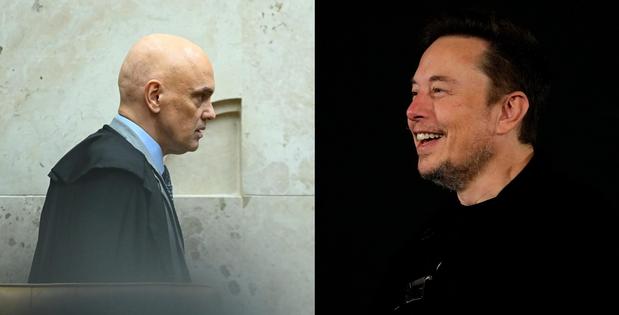Elon Musk’s feud with Brazilian judge is much more than a personal spat − it’s about national sovereignty, freedom of speech and the rule of law
Published in Political News
It is easy to get distracted by the barbs, swipes and bluster of the ongoing and very public spat between the world’s richest man and a fierce justice on Brazil’s highest court. Elon Musk, the billionaire owner of X, posts regularly of his contempt for Supreme Court Justice Alexandre de Moraes – a man Musk has labeled a “dictator” and “Brazil’s Darth Vader.” He makes these comments on a social media platform that Moraes has banned in Latin America’s most populous country as part of a lengthy campaign against disinformation.
But as an expert on Brazilian digital law, I see this as more than just a bitter personal feud. X’s legal battle with Brazil’s Supreme Court raises important questions about platform regulation and how to combat disinformation while protecting free speech. And while the focus is on Brazil and Musk, it is a debate being echoed around the world.
Things came to a head between Musk and Moraes in August 2024, but the battle has been years in the making.
In 2014, Brazil passed the “Marco Civil da Internet” or the “Internet Bill of Rights,” as it is commonly known. Backed by bipartisan support, this framework for internet regulation outlined principles for protecting user privacy and free speech while also creating penalties for platforms that break the rules.
It included a “judicial notice and takedown” system under which internet platforms are liable for harmful user-generated content only if they fail to remove the content after receiving a specific court order.
The approach was designed to strike a balance between protecting free speech and ensuring that illegal and harmful content can be removed. It prevents social media platforms, messaging apps and online forums from being held automatically responsible for users’ posts, while empowering courts to intervene when necessary.
But the 2014 law stops short of creating detailed rules for content moderation, leaving much of the responsibility in the hands of platforms such as Facebook and X.
And the rise of disinformation in recent years, especially around Brazil’s 2022 presidential elections, exposed the limitations of the framework.
The president at the time, far-right populist Jair Bolsonaro, and his supporters were accused of using social media platforms such as X to spread falsehoods, sow doubts about the integrity of Brazil’s electoral system and incite violence. When Bolsonaro was defeated at the ballot by the leftist Luiz Inácio Lula da Silva, an online campaign of election denialism flourished. It culminated in the Jan. 8, 2023, storming of the Brazilian Congress, Supreme Court and the presidential palace by Bolsonaro’s supporters – an event similar to the U.S. Capitol riots two years earlier.
In response to the disinformation campaigns and the attacks, Brazil’s Supreme Court initiated two inquiries – the digital militias inquiry and the antidemocratic acts inquiry – to investigate groups involved in the plot.
As part of those inquiries, the Supreme Court requested social media platforms – such as Facebook, Instagram and X – to hand over the IP addresses and suspend accounts linked to those illegal activities.
But by this time, Musk, who has described himself as a free-speech fundamentalist, had acquired the platform, promising to support free speech, reinstate banned accounts and decrease significantly the platform’s content moderation policy.
As a result, Musk has been openly defying the Supreme Court’s orders since the beginning. In April 2024, X’s global government affairs team began sharing information with the public on what it deemed as “illegal” demands from the Supreme Court.
The feud escalated in late August when X’s legal representative in Brazil resigned and Musk refused to name a new legal representation – a move that was interpreted by Moraes as an attempt to evade the law. In response, Moraes ordered the platform’s ban on Aug. 31, 2024.
The move was accompanied by heavy penalties for Brazilians attempting to circumvent the ban. Anyone using virtual private networks, or VPNs, to access X faces daily fines of nearly US$9,000 – more than the average annual income of many Brazilians. Those decisions were confirmed by a panel consisting of five Supreme Court justices on Sept. 2, 2024. Amid criticism of judicial overreach, however, the full court of 11 justices will discuss and potentially revisit this part of Moraes’ decision.
The X v. Brazil Supreme Court fight has become deeply politicized. On Sept. 7, thousands of Bolsonaro supporters took part in a “pro-free speech” protest. Lula’s administration and the Supreme Court have become targets, with the opposition and right-wing factions framing the platform’s suspension as a symbol of state overreach.
The rhetoric contrasts sharply with the more balanced, deliberative efforts to regulate platforms that began over a decade ago with the Marco Civil da Internet. It also highlights the challenge of finding a balance between free speech and combating disinformation in a deeply polarized environment – an issue that Brazil is far from alone in grappling with.
The political heat surrounding the banning of X doesn’t bode well for Brazil’s ongoing efforts to counter online disinformation and hold platforms accountable for harmful content.
A “fake news bill,” as it has been dubbed by Brazilian media, was introduced by the country’s Congress in 2020. It seeks to create oversight mechanisms and increase transparency around political advertising and content moderation policies.
But despite its good intentions and a very light “regulated self-regulation” approach, the last version of the draft bill was blocked in the Brazilian Congress after three years of debate.
It follows a campaign by right-wing politicians and Big Tech lobbyists who labeled the legislation a “censorship bill,” arguing that it would infringe on free speech and stifle political discourse. As of now, the fate of the bill looks uncertain.
Meanwhile, on Aug. 23, the Supreme Court announced that it will look at two key parts of the Marco Civil as part of a judicial review taking place in November.
The first is the “judicial notice and takedown” process that critics complain is too slow and allows platforms to choose not to adopt more robust content moderation mechanisms. Supporters, however, maintain that judicial oversight is necessary to prevent platforms from arbitrarily removing content, which could lead to censorship.
The second area under review is the part of the Marco Civil that outlines the penalties for companies that fail to follow the rules. The debate centers on whether the current penalties, particularly service suspensions, are proportionate and constitutional. Critics argue that suspending an entire platform violates users’ rights to free speech and access to information, while proponents insist that it is a necessary tool to ensure compliance with Brazilian law and safeguard sovereignty.
The fate of both the “fake news bill” and the Supreme Court’s review could set in place new legal standards for platforms in Brazil and determine how far the country can go in enforcing its laws against global tech companies as it seeks to battle disinformation.
And while the Supreme Court did not directly link the review to the ongoing feud with X, the fight with Musk forms the unavoidable political backdrop to discussions over the future direction of Brazil’s experiment in platform regulation. As such, the fallout of this seemingly personal spat could have major regulatory consequences for Brazil and potentially other countries.
This article is republished from The Conversation, a nonprofit, independent news organization bringing you facts and trustworthy analysis to help you make sense of our complex world. It was written by: Yasmin Curzi de Mendonça, University of Virginia
Read more:
Antisemitism on Elon Musk’s X is surging and dredging up many ancient, defamatory themes of blaming Jews
Elon Musk aims to turn Twitter into an ‘everything app’ – a social media and marketing scholar explains what that is and why it’s not so easy to do
How Lula’s big-tent pragmatism won over Brazil again – with a little help from a backlash to Bolsonaro
Yasmin Curzi de Mendonça does not work for, consult, own shares in or receive funding from any company or organization that would benefit from this article, and has disclosed no relevant affiliations beyond their academic appointment.
































































Comments